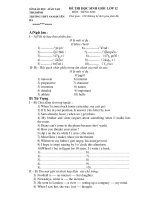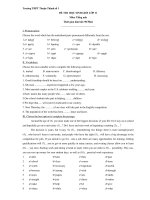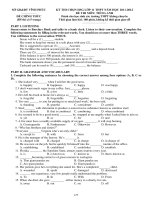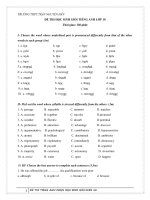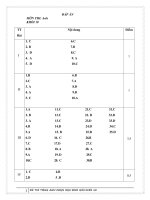- Trang chủ >>
- Đề thi >>
- Đề thi lớp 10
Đề thi học sinh giỏi lớp 10 môn Tiếng Anh Trường THPT Phú Nhuận năm 2014
Bạn đang xem bản rút gọn của tài liệu. Xem và tải ngay bản đầy đủ của tài liệu tại đây (224.96 KB, 10 trang )
I. Choose the word whose underlined part is pronounced differently from that of
the other words
1. a. obsession b. possession c. procession d.
scare
2. a. imagine b. take c. mayor d. ace
3. a. dogged b. backed c. naked d. crooked
4. a. invisible b. disease c. decision d. design
5. a. enough b. tough c. rough d. plough
II. Choose the word that has stress pattern different from that of the other
words
6. a. monument b. minority c. Europe d. providence
7. a. analysis b. particular c. outnumber d.
accidental
8. a. diagram b. dynasty c. diagonal d. diamond
9. a. portable b. temperature c. marvelous d.
reminiscent
10. a. ancestor b. transistor c. equator d.
compressor
III. FIND MISTAKES
11. Not (A) woman held a presidential cabinet position (B) in the United States
until (C) 1933, when Frances Perkins became (D) secretary of labor.
12. He gave (A) me the pen which (B) I did (C) the test successfully (D) yesterday.
ĐỀ SỐ 1
ĐỀ THI HSG TRƯỜNG – TIẾNG ANH 10
Năm học: 2013 – 2014
Thời gian: 90 phút (không kể thời gian giao đề)
Trường THPT Phú Nhuận
13. Too much (A) electric current may flow (B) into a circuit as a result either of a
fault (C) in the circuit and (D) of an outside event such as lightning.
14. The Appalachian Trail, extending (A) approximately 2,020 miles (B) from
Maine to Georgia, is the longer (C) continuous (D) marked footpath in the world.
15. For years, elephants were hunted (A) for food and ivory, and as a result theirs
(B) numbers (C) have been greatly (D) reduced.
16. Barges which carrier (A) most of the heavy (B) freight on (C) rivers and canals
are usually propelled by towing(D).
17. Although (A) afflicted by serious eyesight problems (B), Alicia Alonso was
one the principal (C) stars of the American Ballet Theater and later formed her
own (D) dance company.
18. The ritual (A) combat of animals are (B)triggered by(C) precise signals(D).
19. It is more difficult (A) to write simply, directly, and effective (B)than to
employ (C) flowery but vague(D) expressions that only obscure one’s meaning.
20. Different species (A) of octopuses may measure anywhere (B) from two inches
to cover (C) thirty feet in long(D).
III. GUIDED CLOZE
GREEK THEATRES
The word theatre comes from Greek and literally means seeing place. The
theatre has been popular in ancient times. People did not go to the theatre simply to
see an interesting (21) for the plays formed part of religious festivals.
(22) early Greek theatres consisted of no more than a flat space with an
altar at the foot of a hillside. (23) that time, there were no (24)
as there are in modern theatres, so the (25) stood or sat on the slopes of
the hillside. Gradually, special theatres were made by building large stone or
wooden steps one (26) another up the hillside. In later times, a hut was
built at the far side of the acting area where it formed a background for the actors
(27) the parts of the different characters. Eventually, a (28)
platform was built so that the actors could be seen more clearly. This was the first
appearance of anything (29) our modern stage. As well as these
permanent theatres, there were simple wooden stages (30) around by
actors wandering from one place to another. There was also a hut with curtains that
served both as background scenery and as a dressing room.
21. A. scene B. performance C. scenery D. stage
22. A. Whole B. Complete C. Full D. All
23. A. In B. For C. At D. On
24. A. chairs B. benches C. seats D. stools
25. A. watchers B. players C. viewers D. audiences
26. A. among B. between C. around D. behind
27. A. playing B. making C. doing D. being
28. A. lifted B. raised C. moved D. pulled
29. A. as B. like C. equal D. similar
30. A. carried B. held C. brought D. fetched
IV. READING COMPREHENSION
All mammals feed their young. Beluga whale mothers, for example, nurse
their calves for
some twenty months, until they are about to give birth again and their young
are able to
find their own food. The behavior of feeding of the young is built into the
reproductive
system. It is a nonelective part of parental care and the defining feature of a
mammal, the
(5) most important thing that mammals whether marsupials, platypuses, spiny
anteaters, or
placental mammals have in common.
But not all animal parents, even those that tend their offspring to the point of
hatching or
birth, feed their young. Most egg-guarding fish do not, for the simple reason
that their
young are so much smaller than the parents and eat food that is also much
smaller than
(10) the food eaten by adults. In reptiles, the crocodile mother protects her young
after they
have hatched and takes them down to the water, where they will find food, but
she does
not actually feed them. Few insects feed their young after hatching, but some
make other
arrangement, provisioning their cells and nests with caterpillars and spiders
that they have
paralyzed with their venom and stored in a state of suspended animation so
that their
(15) larvae might have a supply of fresh food when they hatch.
For animals other than mammals, then, feeding is not intrinsic to parental
care. Animals
add it to their reproductive strategies to give them an edge in their lifelong
quest for
descendants. The most vulnerable moment in any animal's life is when it first
finds itself
completely on its own, when it must forage and fend for itself. Feeding
postpones that
(20) moment until a young animal has grown to such a size that it is better able to
cope. Young
that are fed by their parents become nutritionally independent at a much
greater fraction
of their full adult size. And in the meantime those young are shielded against
the vagaries
of fluctuating of difficult-to-find supplies. Once a species does take the step
of feeding its
young, the young become totally dependent on the extra effort. If both parents
are
(25) removed, the young generally do no survive.
31. What does the passage mainly discuss?
(A) The care that various animals give to their offspring.
(B) The difficulties young animals face in obtaining food.
(C) The methods that mammals use to nurse their young.
(D) The importance among young mammals of becoming independent.
32. The author lists various animals in line 5 to
(A) contrast the feeding habits of different types of mammals
(B) describe the process by which mammals came to be defined
(C) emphasize the point that every type of mammal feeds its own young
(D) explain why a particular feature of mammals is nonelective
33. The word "tend" in line 7 is closest in meaning to
(A) sit on (B) move (C) notice (D) care for
34. What can be inferred from the passage about the practice of animal parents
feeding their young?
(A) It is unknown among fish. (B) It is unrelated to the size of the
young.
(C) It is dangerous for the parents. (D) It is most common among
mammals.
35. The word "provisioning" in line 13 is closest in meaning to
(A) supplying (B) preparing (C) building (D) expanding
36. According to the passage, how do some insects make sure their young have
food?
(A) By storing food near their young.
(B) By locating their nests or cells near spiders and caterpillars.
(C) By searching for food some distance from their nest.
(D) By gathering food from a nearby water source.
37 The word "edge" in line 17 is closest in meaning to
(A) opportunity (B) advantage (C) purpose (D) rest
38. The word "it" in line 20 refers to
(A) feeding (B) moment (C) young animal (D) size
39. According to the passage, animal young are most defenseless when
(A) their parents are away searching for food
(B) their parents have many young to feed
(C) they are only a few days old
(D) they first become independent
40. The word "shielded" in line 22 is closest in meaning to
(A) raised (B) protected (C) hatched (D) valued
V. CHOOSE THE BEST ANSWER
41. One problem for teacher is that each student has his/ her own
…………………… needs.
A. separate
B. divided
C. individual
D. distinctive
42. I was ……………………… in the book I was reading and didn’t hear the
phone.
A. submerged
B. distracted
C. gripped
D. engrossed
43. If we hurry, we might get there …………………… to catch the early train.
A. right
B. in time
C. on time
D. before time
44. To get a passport, you must send in your birth ……………… and two
photos.
A. certificate
B. licence
C. paper
D. card
45. She tries to set ……………………………. an hour a week for practice.
A. about
B. down
C. aside
D. in
46. …………………………… stay the night if it’s too difficult to get home.
A. At all costs
B. By all means
C. In all
D. On the whole
47. Robert and his wife ……………………… to my house for tea yesterday
evening.
A. came round
B. came about
C. came down
D. came away
48. Each of the guests ……………………… a bunch of flowers.
A. are given
B. is given
C. were given
D. give
49. To everyone’s surprise, Mr Brown ………………………… at the Trade
Union meeting.
A. turned in
B. turned over
C. turned up
D. turned round
50. Everyone burst out laughing. There was a lot of
………………………………
A. laughs
B. laughter
C. laughings
D. laugh
51. I notice the lorry down the hill.
A. to come B. came C. coming D. having
come
52. I observed a blue car very fast towards the motorway.
A. having driven B. driven C. driving D. to
drive
53. They left the restaurant, two hours over lunch.
A. spending B. spent C. after spend D. having spent
54. It was only then ……… how much I owed to her.
A. had I realize B. that I realized C. did I realize D. I did realize
55. Never ……… so much protest against pollution. It won't be long before we
have a better environment.
A. has there been B. there has been C. has it been D. it has been
56. The doctor told him to keep ………sweets and chocolate to lose weight.
A. at B. off C. up D.
back
57. Nobody seems to be………control of those children.
A. under B. in C. over D. with
58. You know I will always stand…… you if you are in trouble.
A. up B. with C. by D. for
59. Don’t let a good chance go
A. on B. off C. by D. over
60. Not one of the students the answer to that difficult problem.
A. know B. knows C. is knowing D. has know
VII. TRANSFORMATION
1. Attendances at the exhibition have been down this year.
The exhibition
2. I never miss out on a cup of coffee when I visit her flat.
She
3. I only paid a few hundred pounds for the car.
The car
4. The Presidential visit attracted such an enormous crowd that all traffic came to
a standstill.
So many
5. The fox was unsuccessful in reaching the grapes. (use “vain” )
The fox
6. They declared war on the pretext of defending their territorial rights.
The excuse
7. We weren't surprised by his success.
It came as
8. The truth only came out on the publication of the general's personal diaries.
Only when
9. We will break our journey in France on our way to Germany.
We will stop
10. It's sad, but unemployment is unlikely to go down this year.
Sad
_____ GOOD LUCK TO YOU _____



